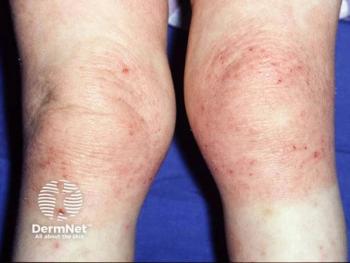
Pediatric Atopic Dermatitis Linked to Learning Disabilities
According to objective and subjective measures, children with more severe atopic dermatitis were more likely to report a learning disability.
More severe atopic dermatitis may be tied to learning disabilities in pediatric populations, a new study suggests.
The investigative team, led by Joy Wan, MD, MSCE, Department of Dermatology, University of Pennsylvania Perelman School of Medicine, used the Pediatric Eczema Elective Registry (PEER) to examine 2074 children with physician-confirmed atopic dermatitis.
“Growing evidence indicates that atopic dermatitis in children is associated with disruptions in sleep, attention, and memory,” Wan and colleagues wrote. “Recent population-based data in the US also demonstrate a greater prevalence of learning disability among children with atopic dermatitis compared with those without it.”
They defined learning disability as disorders leading to impairment of learning and poor mental health, lower educational achievement, and worse occupational outcomes.
As such, the team sought to expound on available evidence to show associations between disease severity and disability.
Atopic Dermatitis and Learning Disability
All participants had been enrolled in PEER between November 1, 2014 – November 30, 2019 at a median age of 6.0 years. The median age during follow-up was 16.1 years.
Furthermore, a majority of evaluated participants was female (53.8%), and most were Black (44.9%) and White (39.4%) race/ethnicity.
The investigators also reported that a majority came from households with annual incomes of $0-$49,000 (52.1%), followed by households with incomes of $50,000-$99,999 (19.6%).
Analysis revealed that 169 (8.2%) participants reported a diagnosis of a learning disability at follow-up.
According to Patient-Oriented Eczema Measure (POEM) scores, which measured atopic dermatitis severity, patients with a learning disability were thus more likely to have worse disease severity (median POEM score, 5 [mild]), compared to those without a disability (median POEM score, 2 [almost clear skin]; P < .001).
Of those patients with a learning impairment, 29.8% were diagnosed with moderate atopic dermatitis (vs 17.0% in the non-disability population) and 8.9% with severe to very severe disease (vs 4.5%; P< .001).
Additionally, the learning disability group was much more likely to self-report high degrees of severity than those not reporting a disability (P < .001).
“In multivariable logistic regression models adjusted for sex, age, race/ethnicity, annual household income, age of atopic dermatitis onset, family history of atopic dermatitis, and comorbid conditions, participants with mild atopic dermatitis (odds ratio [OR], 1.72; 95% CI, 1.11-2.67), moderate atopic dermatitis (OR, 2.09; 95% CI, 1.32-3.30), and severe to very severe atopic dermatitis (OR, 3.10; 95% CI, 1.55-6.19) on the POEM were all significantly more likely to have reported a learning disability than those with clear or almost clear skin,” the investigators wrote.
These findings were also consistent among self-reported measures.
Learning disabilities were also common among patients with diagnosed asthma, ADHD, depression, anxiety, behavioral or conduct problems, and sleep problems, the team noted.
Conclusion
Despite these findings, the investigators stopped short of inferring causality in these associations.
“Further research is thus needed to clarify the association of atopic dermatitis with learning and the mechanisms through which this association may be mediated,” Wan and colleagues indicated. “It is possible that symptoms of atopic dermatitis, such as itch and sleep impairment, may make learning more difficult.”
They also encouraged the need for direct assessments that may further evaluate the timing and phenotypes in children with both learning disabilities and atopic dermatitis.
However, they still urged clinician to consider screening for such disabilities among children with more severe disease presentations.
The study, “
This article was initially published by our sister publication
Newsletter
Like what you’re reading? Subscribe to Dermatology Times for weekly updates on therapies, innovations, and real-world practice tips.











